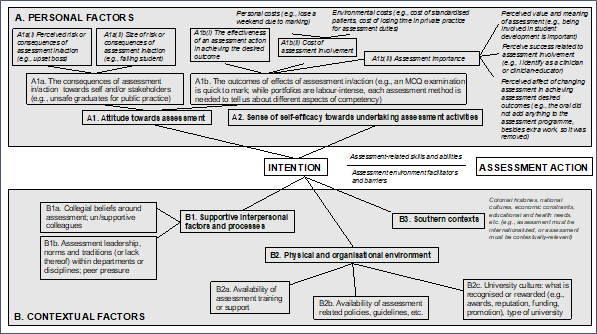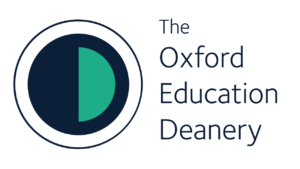The Project
Deanery Digests are short, plain language summaries of the Department of Education’s research outputs. This Deanery Digest is based on the following: Sims, D., Lucio-Ramirez, C. A., & Cilliers, F. J. (2024). Factors influencing clinician-educators’ assessment practice in varied Southern contexts: a health behaviour theory perspective. Advances in Health Sciences Education. doi:10.1007/s10459-024-10341-3
What is this research about and why is it important?
Assessment in medicine and the health professions includes theoretical and clinical (practical) assessments to determine student competency – their knowledge, skills and attitudes. Assessment is therefore of critical importance, because graduates are certified as ‘safe’ for public patient care. We want to ensure that assessment is done well, yet a key stakeholder in assessment, the individual who conceptualises, designs, and implements assessment, is under researched. This research study explored the assessment behaviours of individuals (clinician-educators), assessing in undergraduate medical programmes, using a lens (theoretical model) called ‘Health Behaviour Theory.’
What did we do?
Health Behaviour Theory refers to a family of theories that describe, explain, and predict human health-related behaviours (e.g., how to quit smoking, why don’t we exercise more, how can we decrease COVID-19 infections, etc.). We adapted Health Behaviour Theory from its original health context, to an education context, to explore what factors interact to influence ‘assessor behaviour’.
We interviewed 33 clinician-educators who were responsible for theoretical and clinical assessment of undergraduate medical students in their final year/s across three diverse contexts in the global South: two in South Africa and one in Mexico. Diversity was seen in the colonial histories, national cultures, politics, economics, education and health systems, types of universities (public/state versus private, teaching- versus research-intensive), languages of instruction, and across participants, from a range of medical and health sciences disciplines, career stages, age and genders.
The interview questions were open-ended explorations of assessment practice (e.g., ‘How do you practice assessment and why?) and drew on Health Behaviour Theory for follow-up prompts and later data analysis.
What did we find?
We found several interacting personal and contextual factors that influence assessment practice:
- Attitudes towards assessment can influence how it is practiced. Attitudes are shaped by individuals’ perceptions of ‘impact appraisal’ (e.g., potential positive or negative consequences, and how big or small those consequences may be) and ‘response appraisal’ (e.g., the cost and effectiveness of undertaking an action in achieving a desired outcome):
- How at risk of positive or negative consequences am I, or others, and how big or small are these consequences, if I do/not practice assessment in a particular way?
- How effective (or not) is a particular assessment action in achieving my desired assessment goal? What price do I, or others, need to pay to undertake this particular action? How important is it to me, or others, in doing this specific assessment action?
- Assessment was further shaped by how able individuals believed themselves to be; their sense of ‘self-efficacy’.
- Interpersonal influences consisted of what others (e.g., colleagues, managers, students, patients) thought about assessment, and the accompanied pressure to comply with those beliefs.
- The physical and organisation environment impacted on assessment behaviour on whether assessment-related events and interventions were available (e.g., staff training), along with access to related information, services, and facilities (e.g., university assessment rules and regulations) and the prevailing assessment culture (e.g., traditions, values, norms).
- The context also influenced assessment intentions and practices: in South Africa, considering their national history of racial discriminations, respondents emphasized the need for fair assessment practices. In Mexico, a desire of internationalized practices, to compete with the USA and Europe, was sought – perhaps revealing a lingering colonial mentality?
- Overall, whether assessment intentions (desires and plans) transitioned into action (were implemented in reality) appeared to be mediated by personal competencies (whether individuals possessed the necessary assessment skills and abilities) and the state of their environment (whether it supported or constrained practice).

Factors influencing clinician-educators’ assessment practices: a Health Behaviour Theory model.
What does it all mean anyway?
When it comes to wanting to improve assessment practices, often we focus on the individual and ignore the broader context. Faculty development initiatives should reflect an understanding that both personal and contextual factors interact to shape behaviours and practices. For instance, while assessment training can include developing the assessment skills and abilities of individuals, it should also address challenges around changing the assessment cultures of departments and institutions. It should also ensure sufficient resourcing (e.g., protected time, balanced workload, access to enough human resourcing, venues, assessment materials, etc.) to enable effective assessment to take place.

